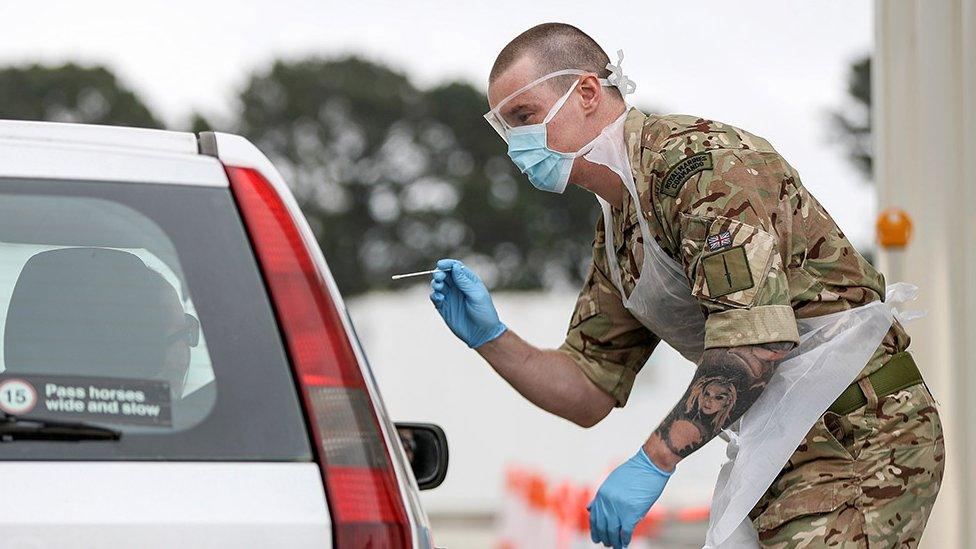Coronavirus: One in five with Covid could test negative
- Published
- comments

The head of the Test and Trace programme has been challenged over the risks of false negative coronavirus results by a committee of MPs.
Dido Harding was asked at the health select committee why people are not repeatedly tested to ensure they do not have coronavirus.
MPs heard 20% of positive cases may be missed by the test.
Earlier Boris Johnson told the Commons tests would be processed within 24 hours by the end of June.
Questioned by Mr Hunt, the PM said the 24-hour target would need to take into account "insuperable problems" such as postal delays.
He said "I can undertake to him now to get all tests turned around in 24 hours by the end of June, except for difficulties with postal tests or insuperable problems like that."
The tests involve a nose and throat swab which is then used to look for the virus's genetic material. It detects active coronavirus infection, so cannot say if someone has recovered from Covid-19.
Testing positive should allow contacts to be traced, and determine whether NHS staff can go back to work.
But the swab tests carried out can deliver false negative results - suggesting someone does not have coronavirus when they are actually positive.
That could be because of the quality of the swab, the timing of the test or issues in the lab.
During the select committee hearing Mr Hunt cited evidence from the University of Bristol, external as suggesting 20% of positive cases could falsely appear as negative, wrongly telling someone they are not infected.
Baroness Harding said she understood estimates of the proportion of false negative results ranged between "two and 20-odd per cent".
She added that the issue of why those with a negative result were not re-tested was "a medical" question for the scientists, and it was her job "to take Sage and chief medical officers' guidance".
A Department of Health and Social Care spokesperson said: "The test is reliable and effective. Like any diagnostic test however, there is always the small possibility of a false negative or a false positive result."
'Best guess'
The Hospital Consultants and Specialists Association (HCSA), which represents hospital doctors, had earlier called for NHS staff to be tested more than once.
Dr Claudia Paoloni, the union's president, said relying on a single negative result risked "infecting patients and staff".
Prof Nicola Stonehouse, a virologist at the University of Leeds, said people needed to be aware that one test wasn't "good enough".
It's necessary to have multiple tests, she said, and they needed to be separated by 72 hours.
Currently, a negative test clears people to return to work provided they don't have symptoms, and means contact tracing isn't triggered.
GP, and diagnostic tests researcher, Dr Jessica Watson told BBC Radio 4's More or Less programme the "best guess" was about 70 in every 100 people who have coronavirus would be picked up by the testing programme.


Testing and tracing is clearly going to be crucial in allowing the UK to get back to some level of normality.
For it to work successfully, two basic things are needed above all else.
People need to trust it and it needs to work effectively. The two are, of course, interlinked.
And, unfortunately, on both counts the jury is out.
The service - as Baroness Harding points out - is only six days old.
It deserves to be given a little time to bed in.
But pretty quickly the public will need to be given information about how it is working and whether people are complying with the requests to isolate.
This is something officials are reluctant to do at the moment until they have properly validated the numbers - understandable given the UK Statistics Authority has already criticised the way testing numbers have been presented.
It also needs people to come forward for testing. Surveys suggest there are around 8,000 new infections a day in the community, but the testing system is picking up less than 2,000 of them - and that includes those diagnosed in care homes and hospitals.
If enough people are not coming forward for a test in the first place, tracing contacts and containing future outbreaks is bound to fail.

Factors affecting the outcome include at what point in their illness someone is tested, how good a sample is taken, along with any problems with processing tests, she said.
Public Health England is expected to publish an evaluation of its tests, used for hospital patients and some staff, this week.
Follow Rachel on Twitter, external

RISK AT WORK: How exposed is your job?
SCHOOLS: When will children be returning?
THE R NUMBER: What it means and why it matters
LOOK-UP TOOL: How many cases in your area?
GLOBAL SPREAD: Tracking the pandemic
